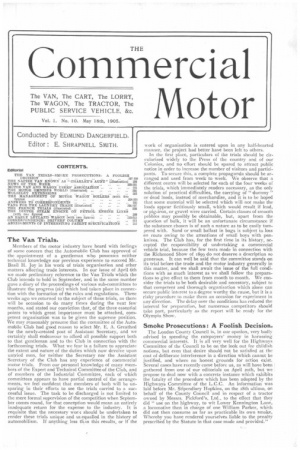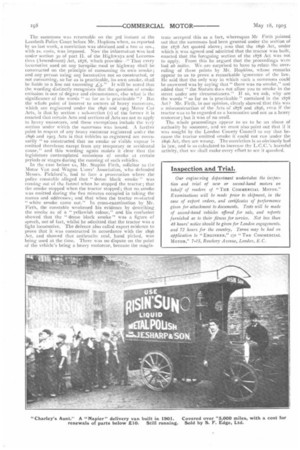The Van Trials.
Page 1

Page 2

If you've noticed an error in this article please click here to report it so we can fix it.
Members of the motor industry have heard with feelings of some concern that the Automobile Club has approved of the appointment of a gentleman who possesses neither technical knowledge nor previous experience to succeed Mr. Basil H. Joy in his work of trials organisation and other matters affecting trade interests. In our issue of April 6th we made preliminary reference to the Van Trials which the Club intends to hold in September, and in the same number gave a diary of the proceedings of various sub-committees to illustrate the progress (sic) which had taken place in connection with the formation of the rules and regulations. Three weeks ago we returned to the subject of these trials, as there will be occasion to do many times during the next few months, and stated our conviction that, of the three essential points to which great importance must be attached, competent organisation was to be given the supreme position. We may reasonably presume that the committee of the Automobile Club had good reason to select Mr. E. A. Greathed for the newly-created post of Assistant Secretary, and we certainly shall endeavour to afford all possible support both to that gentleman and to the Club in connection with the forthcoming trials. What we fear is a failure to appreciate the extent and nature of the duties which now devolve upon untried men, for neither the Secretary nor the Assistant Secretary of the Club has any experience of commercial motor trials. From our personal knowledge of many members of the Expert and Technical Committee of the Club, and of members of the Industrial Committee, each of which committees appears to have partial control of the arrangements, we feel confident that members of both will be unsparing in their efforts to see the trials carried to a successful issue. The task to be discharged is not limited to the mere formal supervision of the competition when September comes round, for that conception would mean an entirely inadequate return for the expense to the industry. It is requisite that the necessary wort should be undertaken to render these trials unique and ut,equalled in the history of automobilism. If anything less than this results, or if the work of organisation is entered upon in any half-hearted manner, the project had better have been left to others.
In the first place, particulars of the trials should be circularised widely to the Press of the country and of our Colonies, and no effort should be spared to attract public notice in order to increase the number of visitors and partioipants. To secure this, a complete propaganda should be arranged and used from week to week. We observe that a different centre will be selected for each of the four weeks of the trials, which immediately renders necessary, as the only solution of practical difficulties, the carrying of "dummy or dead loads, instead of merchandise, and it is to be hoped that some material will be selected which will not make the loads appear fictitiously small, which would result if lead, or pig-iron, or gravel were carried. Certain classes of smooth pebbles may possibly be obtainable, but, apart from the question of bulk, it will be an unfortunate circumstance if the substance. chosen is of such a nature as to be easily tampered with. Sand or small ballast in bags is subject to loss en route owing to the attentions of small boys with penknives. The Club has, for the first time in its history, accepted the responsibility of undertaking a commercial vehicle trial, because the few tests made in connection with the Richmond Show of 1/399 do not deserve a description so generous. It can well be said that the committee stands on its trial before the trade and the motor industry generally in this matter, and we shall await the issue of the full conditions with as much interest as we shall follow the preparations to give effect to them from month to month. We consider the trials to be both desirable and necessary, subject to that competent and thorough organisation which alone can secure public intvrest lo a degree worthy the cause, but it is a risky procedure to make them an occasion for experiment in any direction. The delay over the conditions has reduced the interval for preparation, but numerous competitors should take part. particularly as the report will be ready for the Olympia Show.
Smoke Prosecutions: A Foolish Decision.
The London County Council is, in our opinion, very badly advised in spending the ratepayers' money in harassing commercial interests. It is all very well for the Highways Committee of the Council to be on the look out for childish notions, but even that desire should not be satisfied at the cost of deliberate interference in a direction which cannot be justified, and where no honest grounds for action exist. Several cases have recently come before us, as will have been gathered from one of our editorials on April 20th, but we propose to deal now with a concrete instance which exhibits the fatuity of the procedure which has been adopted by the Highways Committee of the L.C.C. An information was laid before Mr. Stipendiary Hopkins, on the i8th ultimo, on behalf of the County Council and in respect of a tractor owned by Messrs. Picicford's, Ltd., to the effect that they did " use on the highway, to wit Lower Kennington Lane, a locomotive then in charge of one William Parker, which did not then consume as far as practicable its own smoke, Whereby you have rendered yourselves liable to the penalty prescribed by the Statute in that case made and provided."
The summons was returnable on the 3rd instant at the Lambeth Police Court before Mr. Ilopkins when, as reported by us last week, a conviction was obtained and a tine ea
with 2s. costs, was imposed. Now the information was laid under section 30 of part 11. of the Highways and Locomotives (Amendment) Act, 1878, which provides-" That every locomotive used on any turnpike road or highway shall be constructed on the principle of consuming its own smoke; and any person using any locomotive not so constructed, or not consuming, so far as is practicable, its own smoke, shall be liable to a fine not exceeding-,25." It will be noted that the wording distinctly recognises that the question of smoke emission is one of degree and circumstance, else what is the significance of the words " so far as is practicable "? But the whole point of interest to owners of heavy motorcars, which are registered under the /896 and 1903 Motor Car Acts, is that by section i sub-section (1) of the former it is enacted that certain Acts and sections of Acts are not to apply to heavy motorcars, and these exemptions include the very section under which the summons was issued. A farther point in respect of any heavy motorcar registered under the 1896 and 1903 Acts is that vehicles so registered are necessarily " so constructed that no smoke or visible vapour is emitted therefrom except from any temporary or accidental cause," and this wording again makes it clear that the legislature contemplated emissions of smoke at certain periods or stages during the running of such vehicles, In the case before us, Mr. Staplee Firth, solicitor to the Motor Van and Wagon Users' Association, who defended Messrs. Pickford's, had to face a prosecution where the police constable alleged that " dense black smoke " was coming out of the funnel when he stopped the tractor ; that the smoke stopped when the tractor stopped; that no smoke was emitted during the five minutes occupied in taking the names and addresses; and that when the tractor re-started " white smoke came out." In cross-examination by Mr. Firth, the constable weakened his evidence by describing the smoke as of a " yellowish colour," and his confusion showed that the "dense black smoke" was a figure of speech, not of fact, whilst he admitted that the tractor was a light locomotive. The defence also called expert evidence to prove that it was constructed in accordance with the 1896 Act, and showed that anthracite coal, hand picked, was being used at the time. There was no dispute on the point of the vehicle's being a heavy motorcar, because the magis trate accepted this as a fact, whereupon Mr Firth pointed out that the summons had been granted under the section of the 1878 Act quoted above; also that the 1896 Act, under which it was agreed and admitted that the tractor was built, enacted that the foregoing section of the 1878 Act was not to apply. From this he argued that the proceedings were bad tab inilio. We are surprised to have to relate the overruling of these points by Mr. Hopkins, whose remarks appear to us to prove a remarkable ignorance of the law. He said that the only way in which such a summons could be answered was by saying that " there was no smoke," and added that " the Statute does not allow you to smoke in the street under any circumstances." If so, we ask, why are the words " so far as is practicable " contained in the 1878 Act ? Mr. Firth, in our opinion, clearly. showed that this was a misconstruction of the Acts of .1878 and 1896, even if the tractor was to be regarded as a locomotive and not as a heavy motorcar ; but it was of no avail.
The whole proceedings appear to us to he an abuse of authority by someone, and we must also point out that if it was sought by the London County Council to say that because the tractor emitted smoke it could not run under the /896 Act, they are wrong. The conviction is so obviously bad in law, and is so calculated to increase the L.C.C.'s harmful activity, that we shall make every effort to see it quashed.
















